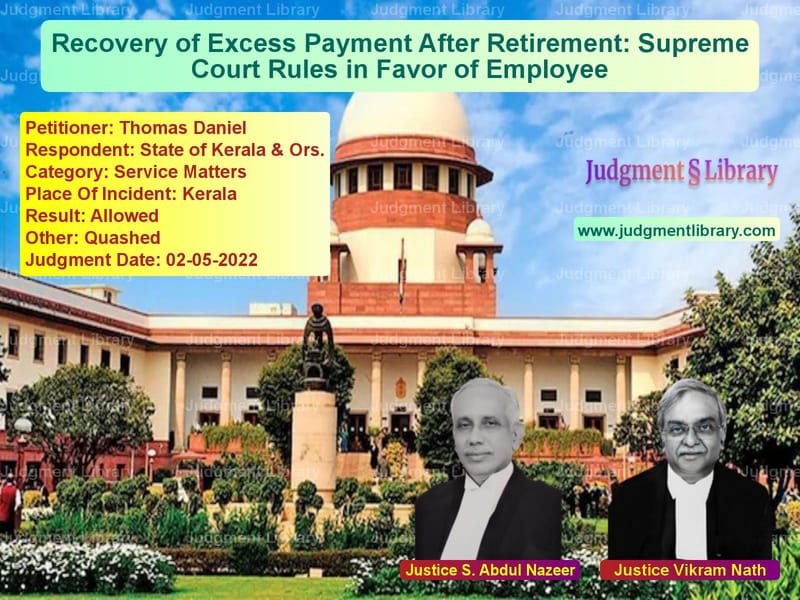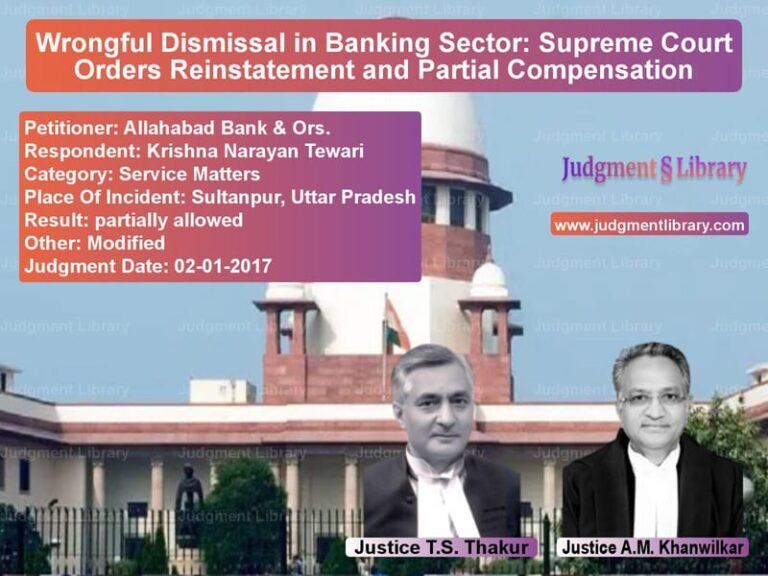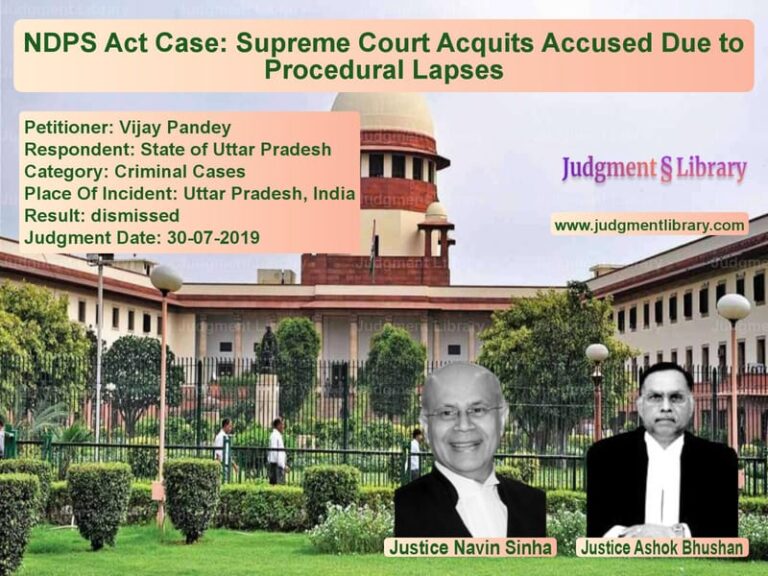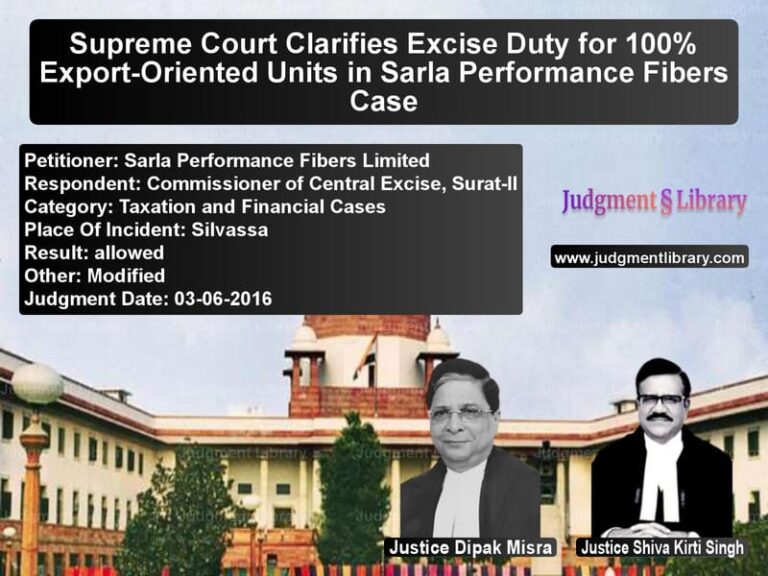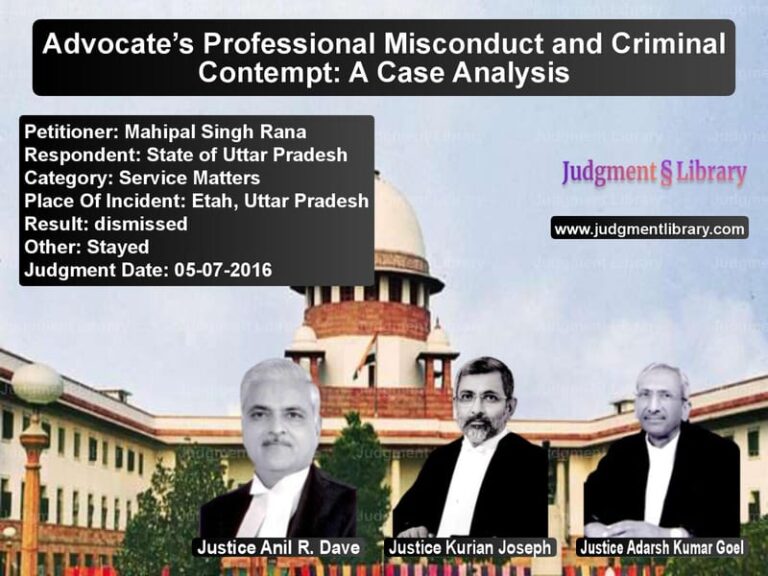Recovery of Excess Payment After Retirement: Supreme Court Rules in Favor of Employee
The Supreme Court of India recently delivered a crucial ruling in the case of Thomas Daniel vs. State of Kerala & Ors.. This case dealt with whether increments granted to a government employee while in service could be recovered from him 10 years after his retirement on the ground that the increments were granted due to an error. The Court ruled in favor of the retired employee, emphasizing that recovery of excess payments made without any fraud or misrepresentation on the part of the employee is unjustified.
Background of the Case
Thomas Daniel, the appellant, joined service in 1966 as a High School Assistant at Craven High School, Kollam, an aided school in Kerala. During his tenure, he availed of leave without allowance (LWA) from October 20, 1972, to March 31, 1973, and again from July 2, 1973, to March 28, 1974, to pursue a postgraduate degree (M.Sc. in Chemistry). He was later promoted to Headmaster of the school on June 1, 1989, and was granted senior grade promotion, leading to a revision in his pay scale.
In 1997, an audit report from the Accountant General of Kerala pointed out that the period of leave obtained by Thomas Daniel for higher education should not have been included in his total qualifying service. Consequently, it was recommended that the increments granted to him be recovered. However, by this time, Thomas Daniel had already retired on March 31, 1999, and his pensionary benefits and Death-cum-Retirement Gratuity (DCRG) had been withheld.
Key Legal Issues Before the Supreme Court
- Whether excess payments made to an employee due to an administrative error can be recovered after retirement.
- Whether the government’s action in withholding the appellant’s pensionary benefits was legally justified.
- Whether Thomas Daniel had a legal right to challenge the recovery of increments granted to him during his service.
Arguments Presented
Petitioner’s (Thomas Daniel) Arguments
- The petitioner contended that the excess payments were made due to a mistaken interpretation of the Kerala Service Rules by the employer and not due to any fraud or misrepresentation on his part.
- He had retired 10 years prior, and any recovery at this stage would cause undue hardship.
- His DCRG was withheld, and he had undergone a bypass surgery, leading to financial distress.
- The principles of natural justice and fairness should prevent the government from recovering such payments long after his retirement.
Respondent’s (State of Kerala) Arguments
- The State of Kerala argued that the increments granted to Thomas Daniel were based on a misinterpretation of service rules.
- The period during which he was on leave without allowance should not have been counted for increments.
- Since he had received excess payments, the government had a right to recover them.
Supreme Court’s Observations and Ruling
1. No Fraud or Misrepresentation by the Employee
The Supreme Court emphasized that Thomas Daniel had not misrepresented any facts or committed fraud. The excess payment was due to an administrative error, and it would be unjust to hold him accountable for the mistake made by the authorities.
The Court noted:
“If the excess amount was not paid on account of any misrepresentation or fraud by the employee, or if such excess payment was made by the employer by applying a wrong principle for calculating the pay, such payments are not recoverable.”
2. Hardship Caused by Recovery After Retirement
The Court observed that recovery after 10 years of retirement would impose a severe hardship on the retired employee, particularly considering his medical condition. It stated:
“A retired employee, especially one who has undergone medical treatment and is financially burdened, should not be subjected to recovery of excess payment after such a long period.”
3. Precedents in Favor of the Employee
The Supreme Court cited multiple previous judgments that had held that recovery of excess payments made due to administrative errors was impermissible. It referred to:
- Sahib Ram vs. State of Haryana (1995) – Restrained recovery of excess payment made due to a mistaken interpretation of rules.
- Col. B.J. Akkara vs. Government of India (2006) – Held that excess payments made by the employer due to incorrect calculations were not recoverable.
- Syed Abdul Qadir vs. State of Bihar (2009) – Ruled that recovery of excess amounts made due to an erroneous interpretation of rules should not be allowed.
- State of Punjab vs. Rafiq Masih (2015) – Established that recovery of excess payments from retired employees or low-income groups is unjust and causes undue hardship.
4. Setting Aside High Court’s Judgment
The Supreme Court overturned the judgments of both the Single Bench and Division Bench of the High Court, which had upheld the recovery order. The Court ruled:
“An attempt to recover increments granted 10 years after retirement is unjustified and against the principles of equity and fairness.”
Impact of the Judgment
The Supreme Court’s ruling has significant implications:
1. Protection for Retired Employees
The judgment strengthens protections for retired government employees, ensuring that they are not subjected to arbitrary recovery proceedings for payments made due to administrative errors.
2. Ensuring Fairness in Government Policies
The ruling ensures that government employers cannot rectify past mistakes at the cost of retired employees who have already spent the payments received.
3. Precedent for Future Cases
The judgment serves as a binding precedent for similar cases where retired employees face recovery proceedings for administrative errors made by the employer.
Conclusion
The Supreme Court’s decision in Thomas Daniel vs. State of Kerala & Ors. is a landmark ruling in service law. It reinforces the principle that government employees should not be penalized for mistakes made by the administration, particularly after retirement. By quashing the recovery order, the Court has upheld fairness, justice, and protection for retired employees, ensuring that they are not burdened with financial liabilities caused by errors beyond their control.
Petitioner Name: Thomas Daniel.Respondent Name: State of Kerala & Ors..Judgment By: Justice S. Abdul Nazeer, Justice Vikram Nath.Place Of Incident: Kerala.Judgment Date: 02-05-2022.
Don’t miss out on the full details! Download the complete judgment in PDF format below and gain valuable insights instantly!
Download Judgment: thomas-daniel-vs-state-of-kerala-&-or-supreme-court-of-india-judgment-dated-02-05-2022.pdf
Directly Download Judgment: Directly download this Judgment
See all petitions in Pension and Gratuity
See all petitions in Employment Disputes
See all petitions in Judgment by S. Abdul Nazeer
See all petitions in Judgment by Vikram Nath
See all petitions in allowed
See all petitions in Quashed
See all petitions in supreme court of India judgments May 2022
See all petitions in 2022 judgments
See all posts in Service Matters Category
See all allowed petitions in Service Matters Category
See all Dismissed petitions in Service Matters Category
See all partially allowed petitions in Service Matters Category

